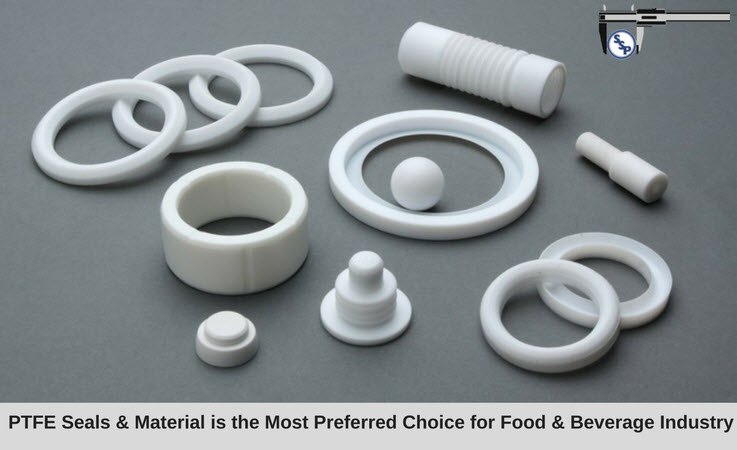Why are PTFE seals favored in the Food Industry?
Apr 05, 2018 Materials | PTFE
With plastic being one of the successful commercial materials, there are abundant varieties available for consideration in the food industry. Although many of these varieties share common properties, still not all are suited for the said industry. This is because various applications in the food industry demand reliable sealing at all temperatures. There are a few materials that meet this requirement efficiently. PTFE is one of those materials, which are used for sealing in the food industry. These seals can easily withstand intensive sterilization, and cleaning. Is that all? No. Read this post to know what properties make PTFE a preferred choice in the food and beverage industry.

7 Beneficial Features of PTFE Material that makes it Suitable for the Food Industry
The following beneficial features of this material have paved for its adoption in the food industry.
- Excellent Chemical Resistance: The PTFE material is made of strong intrapolymer chain bonds that repel most chemicals, thereby making them inert at high temperatures and pressures. There are only a few media, which are known to react with PTFE. These include fluorine, alkaline metals, chlorine, and oxygen difluoride. The chemical compatibility of the seals made from PTFE material helps ensure their resistance to various aggressive chemical cleaners used in the food industry. Due to this chemical inertness, the material is preferred in food applications, and has received FDA approval for the same. Also, PTFE is known to repel most debris, as well as liquids from its surface.
- Hygienic Design: PTFE seals require no lubrication. This is due to its low coefficient of friction, which helps eliminate any chance of contamination due to lubricant. Also, it helps avoid regular maintenance. The material also has wide operating temperature range, which makes it suitable for cleaning operations at high temperatures.
- Excellent Thermal Stability across a Wide Temperature Range: PTFE is known for its high melting point (342 °C). Its morphological characteristics enable seals made from the compound to perform continuously at service temperatures up to 260°C. The physical properties of other plastics degrade at this temperature. This thermal stability have contributed to the rise in demand of PTFE seals in cryogenic applications to seal media like liquid helium and liquid nitrogen. PTFE is one of those few plastics, which have unique property to resist material aging, alteration and degrading across the vast range of temperatures.
- Zero Water Absorption: The material doesn’t swell up even if absorbs moisture. This biological inertness makes it a suitable choice for sealing various moisture-filled food items. Also, it never compromises the taste when it comes in contact with various dairy and food products.
- Wear Resistance: This property stems from its non-resistance from chemicals and high temperature tolerance. Today, PTFE pipes and hose assemblies are used in food facilities, where acids are involved.
- Affordability: The material has one of the brilliant price to performance ratios. This factor along with the ones mentioned above have contributed to the popularity of the polymer in the food industry.
- Adherence to Industry Standards: Seals and gaskets made from PTFE meet 21 CFR 177.1550. This means it has received FDA approval, which is an important consideration in the food and beverage industry.
With such a big role to essay, it is important that you source these seals from an industry-leading manufacturer. SSP Manufacturing, Inc. is one of the preferred manufacturers and suppliers of PTFE seals for the food and beverage industry in the US.

Related Post
 sales:
gm@sspseals.com
Toll Free: +1-888-238-SEAL Request A Quote
sales:
gm@sspseals.com
Toll Free: +1-888-238-SEAL Request A Quote

